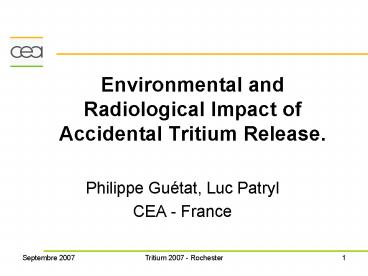Environmental and Radiological Impact of Accidental Tritium Release'
1 / 16
Title:
Environmental and Radiological Impact of Accidental Tritium Release'
Description:
Codex Alimentarius. 1 year exposure after accident. 550 kg/an ingestion ... Consistent with codex alimentarius principles 1 mSv 10% of a huge consumption ... –
Number of Views:65
Avg rating:3.0/5.0
Title: Environmental and Radiological Impact of Accidental Tritium Release'
1
Environmental and Radiological Impact of
Accidental Tritium Release.
- Philippe Guétat, Luc Patryl
- CEA - France
2
Framework objectives
- IAEA program EMRAS 7 participants
- This study aimed at giving practical guidance to
decision-makers in the case of tritium release - Gives technical elements to set a value for food
reference level for Tritium after accident
3
hypothesis
- 10 g of tritium (3700 TBq) accidental release at
20m high (HTO or HT) - At the end of June, in temperate climate
- Meteorological conditions
- sunny day, unstable 2 m/s wind
- cloudy day, neutral 5 m/s wind and 15 mm rain
- clear night, stable conditions, 2 m/s wind.
4
The different mechanisms involved in plants
contamination
Incorporation rate
harvest
deposition
SOIL
Decrease slope
5
Mechanisms and dose constitution
- 6 contributions to dose
- Inhalation transcutaneous few mn
- Air vegetable contamination HTO few days
- Air vegetable OBT few
weeks - Soil veg. contamination HTO few months
- Soil veg. Contamination OBT few months
- Animal products more or less in equilibrium
with fodder - Grass - Food garden veg cereals milk meat
6
Reference levels after accident
- ICRP
- 10 mSv 100 mSv
- No optimisation
- Intervention
intervention - Codex Alimentarius
- 1 year exposure after accident
- 550 kg/an ingestion
- 10 of food from contaminated area
- 1 mSv
7
Total impact of a 10g HTO release at 1km
Strong influence of atmospheric diffusion
conditions
Some conditions where optimization is required
- OK for fine sunny day
- Factor 10 for rain
- gt Factor 10 for night
10 g of HTO the frontier.
optimization limited to few km
8
Dose details by pathway
(At normalized conc. )
Vegetable Ingestion main pathway
Garden veg or cereal
With rain no change. At night, still food.
9
Relative importance of mechanisms
(rain case )
(rain increases slightly soil pathway.)
Air pathway slightly dominant
OBT generally dominant
The dose has to be integrated over one year
10
Reference level for food trade after accident
(calculated for 1mSv in1 year after accident
10 local and 650 kg/y)
107 to define area concerned the 1st day
106 to precise area in the following days
(After 2 days equilibrium reached with soil water)
Not to be assimilated to 104 ,drinkable limit for
stable consumption
11
Other results
- No big differences between adult and infants
- Activity of animal products lower than vegetable
activities. - For a HT release, impact is about 1 HTO release.
- Still strong incertainties in models.
- The case of Night - soil contamination
12
Example for night assessment
- Level reached - slopes
13
Conclusions what to manage ?
- For release of Tritiated water (HTO) 10 g of T
in HTO release has a small impact - 1kg of T in HT release has the same impact
- No big differences between adult and infants
- Vegetable ingestion is the main pathway
- Doses have to be integrated over 1 year (to the
next winter) - Optimization concerns the first crop.
14
Conclusions for environment
- Diffusion atmospheric conditions have a large
effect, (maintenance of knowledge?) - Rain has a small effect on impact.
- Seasons have a large effect on impact
- Wheat or not, garden or not
- Translocation of organic matter from leaves to
edible part of the vegetable. - Tritium does not concentrate in food chain
15
Conclusions what level for food trade ?
- 106 Bq/kg seems the right level
- Consistent with the 10 mSv ICRP level for
optimization of interventions - Consistent with codex alimentarius principles 1
mSv 10 of a huge consumption level
decreasing after an accident assessment for 1
year. - Consistent with 104 Bq/L for drinkable water in
normal conditions.(0,1mSv-100)
16
Conclusions for scientists
- General features are known but
- Are we able to do better than a factor 10 ?
- What fundamental parameters should be known in
the vicinity of a tritium plant ? - Some experiments to realize
- deposition velocity
- Air-plant exchanges during the night
- Parts coming from air and from soil.































